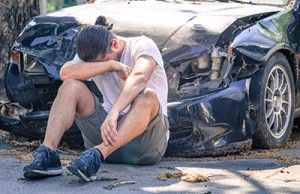
There are more than 6 million car accidents every year on United States roadways – and no two are ever the same.
Everyone who has ever been in an accident handles the emotional aftermath differently.
Following a car accident, some people may experience:
- Shock
- Anxiety and worry
- Fear and guilt
- Anger
- Disbelief that the accident really happened
- Constantly reliving the accident in one’s mind
Many people have some or all of these feelings after being in an accident, and it is quite understandable.
Experiencing these feelings and subsequently dealing with them allows car accident victims to cope with the emotionally traumatic event.
Sometimes however, these feelings can become so overwhelming that they inhibit your ability to carry on with your life.
Knowing the Difference Between Healthy and Unhealthy Feelings
It is typical for car accident victims to experience any or all of the preceding symptoms immediately following the accident.
Then, as time passes, the symptoms diminish and the person continues to live their life- just as they did before the accident.
Sometimes however, the feelings stay with a person for an extended period of time, or even worsen over time.
When this happens, the feelings get in the way of normal, daily life and become unhealthy.
If this has happened to you, you could be suffering from car accident PTSD (post-traumatic stress disorder).
Suffering from PTSD could cause you the following difficulties:
- Persistent feelings of uneasiness,
- Problems driving or riding in a car,
- Excessive anxiety, irritability, or anger,
- Feelings of disconnection with others,
- Insomnia and nightmares,
- Not wanting to have medical tests and procedures performed,
- Incessant and uncontrollable memories of the accident.
Coping With Car Accident PTSD
One of the best and easiest ways to cope with your feelings following a car accident is to talk with loved ones about your thoughts, feelings, and actions at the time of the accident and during the days after the accident.
Make an effort to return to your daily routine as soon as you are able.
Try to stay active, participating in any activities that don’t aggravate injuries you might have sustained in the accident.
Follow up with your doctor. He or she can refer you to any necessary specialists who can facilitate your recovery, including counselors or therapists, as well as prescribe any medications that may be required to manage your pain.
It is important to understand that your feelings are very real and if you do not treat car accident PTSD then you may find yourself suffering from severe depression, isolation, and crippling anxiety.
A psychologist or psychiatrist can help you through this difficult time.
Most importantly, learn how to drive defensively. Doing so can reduce your chance of being in future accidents.
Observing the posted speed limit, wearing your seatbelt, avoiding distractions, and not driving while you are impaired are all ways of staying safer behind the wheel.
